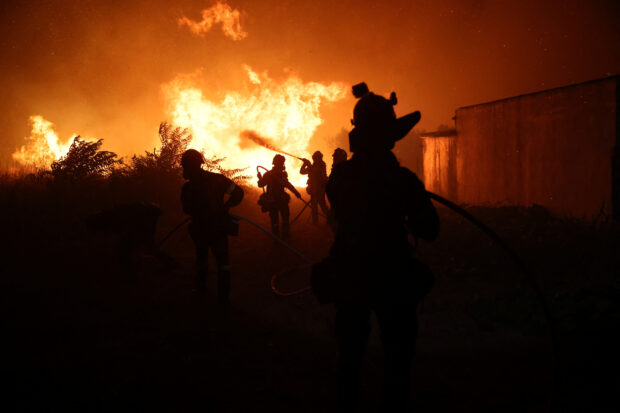Europe’s heatwave turns deadly as 18 burned bodies found in Greek fires

Firefighters try to extinguish a wildfire burning near the village of Makri on the region of Evros, Greece, August 22, 2023. (REUTERS)
ALEXANDROUPOLIS, Greece – Eighteen charred bodies were found in a remote village in northern Greece on Tuesday where wildfires have been raging for days, the fire brigade said, as a heatwave that has seen red alerts issued across southern Europe turned deadly.
Greek media, without citing sources, said the bodies found south of the village of Avantas were thought to be of migrants. The broader Evros region is a popular route for migrants crossing from Turkey into Greece.
Firefighters were also battling blazes in Spain, Italy and Portugal as the region suffered hot, dry and windy conditions that scientists have linked to climate change.
Temperatures in many parts of the region were expected to reach or exceed 40 degrees Celsius (104 degrees Fahrenheit), forecasters said.
In the Greek port town of Alexandroupolis, not far from Avantas, wildfires forced the evacuation of dozens of hospital patients, including newborn babies. A ferry was turned into a makeshift hospital after 65 patients were evacuated from the University Hospital.
Article continues after this advertisementElderly patients lay on mattresses strewn across the cafeteria floor, paramedics attended to others on stretchers and a woman held a man resting on a sofa, an IV drip attached to his hand.
Article continues after this advertisement“I’ve been working for 27 years, I’ve never seen anything like this,” said nurse Nikos Gioktsidis. “Stretchers everywhere, patients here, IV drips there … it was like a war, like a bomb had exploded.”
On Monday, the burned body of another man, also believed to be a migrant, was found in the region, a police official said. Two new blazes also broke out near the Greek capital Athens.
“Weather conditions are extreme and will remain extreme for the coming days,” Fire Service spokesman Vassilis Varthakogiannis told ERT TV.
WILDFIRES IN SPAIN, ITALY
In Spain, where most of the country was in very high or extreme risk of wildfire as a consequence of the summer’s fourth heatwave, authorities were struggling to stabilise a huge wildfire that has been ravaging forests on the island of Tenerife for a week.
The blaze has burned through 15,000 hectares in 12 municipalities forcing the evacuation of thousands of people.
In neighbouring Portugal, authorities placed more than 120 municipalities in the north and central areas, as well as in some parts of the Algarve – a popular holiday destination in the south – at maximum risk of wildfires due to the heat.
More than 100 firefighters backed by 10 aircraft were battling a wildfire that erupted on Monday night in the northern city of Baião.
In Italy, around 700 people have been evacuated after a fire broke out on Monday on the Tuscan island of Elba, in the woods between Rio Marina, firefighter Alessandro Vitaliano told Reuters. No casualties have been reported.
A total of 14 hectares have burned so far. Evacuees are expected to return to their homes in the evening, Italian news agency ANSA said, after the fire was contained. The cause of the fire was not known.
Italy issued hot weather red alerts in 16 of the country’s 27 main cities on Tuesday, including Rome, Milan and Florence, with the number set to rise on Wednesday. A red alert denotes “emergency conditions”, the health ministry said, advising people not to go out during the hottest part of the day.
DANGEROUS CONDITIONS
In France, four southern regions – the Rhone, Drome, Ardeche and Haute-Loire – were placed under red alert, the country’s most serious warning. This allows authorities to call off events and close public facilities if needed.
Climbers were asked to delay scaling Mont Blanc, Europe’s highest peak, because high temperatures have created dangerous conditions.
Grape-pickers in wine-producing regions of southern France have been advised to start work on the harvest in the early hours of the morning to avoid sweltering in the late summer heatwave.
The high temperatures were affecting large parts of France and were expected to peak at 42C in the Rhone valley over the next 48 hours.